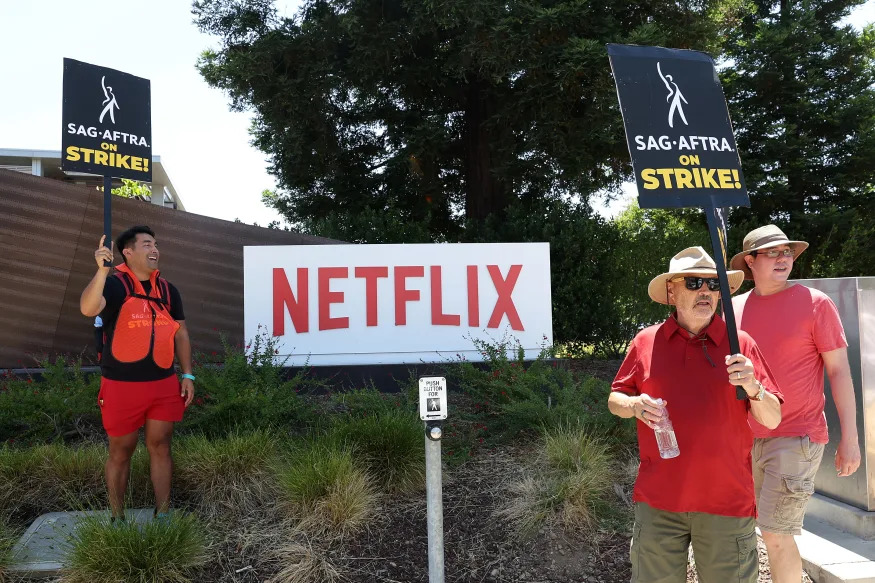Netflix is facing criticism for listing an artificial intelligence product manager role with a salary of up to US$900,000 amid the ongoing actors’ and writers’ strikes. Actors are campaigning for increased base pay, higher streaming residuals and assurances that their jobs won’t be replaced by AI — and 87% of Screen Actors Guild members earn $26,000 or less, the guild has said, a far cry from well-known actors’ multi-million-dollar paychecks. Still, the Netflix salary isn’t out of line with what leading tech companies pay for top AI talent, with some researchers earning in excess of US$1 million a year.
- Netflix “isn’t interested in hiring million-dollar A.I. experts to replace stars and creators,” writes Puck’s Julia Alexander. “It wants more efficiencies … and to expand its gaming capabilities. To that end, Netflix is competing with companies like Google, Meta, and Microsoft in this space.”
By Saundra Latham, Editor at LinkedIn News
Netflix lists $900,000 AI job as actors and writers continue to strike
That’s up to $3,500 per day, while many actors make $200.

The job listing indicates that the AI will be used to “create great content” and not just develop new algorithms to recommend shows and movies. The posting also alludes to a far-reaching effort by the streaming giant to integrate artificial intelligence in “all areas of the business.” A separate section on the company’s website goes on to say that Netflix uses AI “to optimize the production of original movies and TV shows.”
That’s not the company’s only AI-heavy job posting promising a giant payday. Netflix is also hiring a technical director for generative AI at its burgeoning gaming studio that pays an annual salary of up to $650,000, as reported by The Intercept.These efforts are already bearing fruit, as Netflix currently airs a Spanish reality dating series called Deep Fake Love that scans contestant’s faces to create AI-generated “deepfakes” and its gaming studio employs generative AI to compose narratives and dialogue.
This all comes after striking actors rejected a proposal from the Alliance of Motion Picture and Television Producers (AMPTP) that generously offered workers a one-time $200 day rate for performers to get scanned for future use as AI-enhanced CGI simulacrums forever, until the end of time. SAG-AFTRA says the company would “own that scan, their image, their likeness, and be able to use it for the rest of eternity in any project they want with no consent and no compensation.”
By: Lawrence Bonk, engadget
Business executives often think that managing #brand, #reputation and #CustomerExperience is about big strategies, but everything your company says and does is under a microscope. You don’t prove your commitment to customers, employees, and corporate values just with big programs and campaigns but with your day-to-day priorities, decisions, and activities.
For example, in the midst of a writers and actors strike, Netflix posted an AI job with a salary of up to $900,000. Not only are studios and streamers saying they can’t afford to meet strikers’ demands, they also seek to make more use of AI to supplement (or replace) writers and actors. As Engagdet points out, this employee may make up to $3,500 per day, while many actors make $200. (Some folks like to mock the marquee millionaires walking the picket line, but the strikes are more about protecting the actors and writers who work on the margins.)
I’m sure no one in Netflix HR or Product Management gave much thought to how this job posting might play during the labor action. But, should Netflix have posted this job at this time under these circumstances?
I think an organization concerned with managing its reputation and customer relationships might’ve paused rather than proceeded. In addition to the article I am sharing from Engagdet, Netflix’s job posting was covered yesterday by Fortune, MarketWatch, The Guardian, Mashable, Deadline, SFGate, and The Independent. (I expect it will get even more attention from the mainstream news media today.)
PR, brand and reputation management, and CX aren’t just about the big communication programs, campaigns, and strategies you execute. As Gartner found in its 2022 Social Justice research, consumers are increasingly watching what your organization says and does to make sure what you do matches what you say and what they expect.
Netflix does, of course, have every right to post any job it wants at any time, regardless of ongoing labor actions. But, I suspect the streamer’s PR department is working overtime this week trying to deal with the repercussions of one job posting. Between the rising level of critical attention and the way that job posting could impact negotiations, Netflix is today reactively dealing with issues it might have proactively prevented.
What does this mean to you? If you manage brand, reputation, or customer relationships, you should ask yourself what an employee or leader might do today that could become a reputation-damaging meme or news story. Will a leader who extols your company’s DEI commitment make a giant contribution to a politician trying to remove protections for marginalized communities? Will an employee deny access to restrooms to a customer based on their race or identity? These are things you need to worry about and manage to prevent brand harm, build loyalty and trust, and prevent costly PR missteps.






